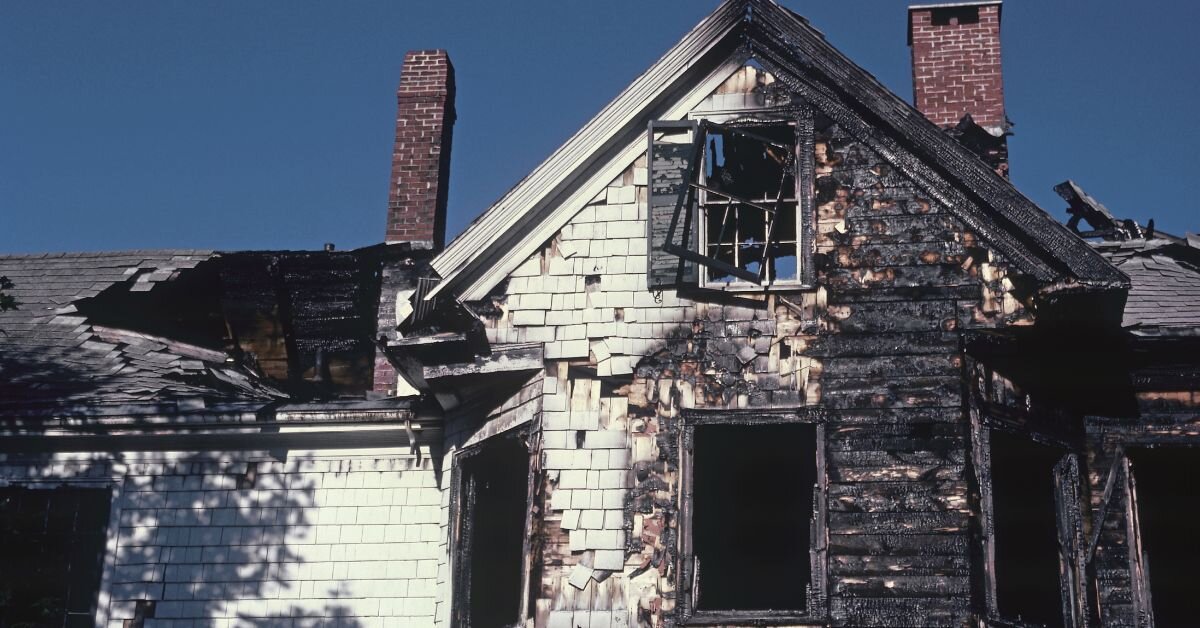
Selling a fire-damaged property in California is no walk in the park, that’s for sure. Fires don’t just destroy structures—they leave emotional and financial scars, too. But here’s the deal: selling a fire-damaged property can be done, and it doesn’t have to be overwhelming if you know how to approach it right. Whether you’ve got minimal damage or a complete disaster, following these tips for selling a fire-damaged property will help you get through the process without pulling your hair out. Let’s dive in.
1. Assess How Bad the Damage Is
Before you even think about selling, you’ve got to figure out what you’re working with. Is the house still standing? Is it just smoke damage, or did the fire hit the structure hard? That’s where a professional inspector comes in. They know their stuff and can give you a full breakdown of the fire-damaged home sale process.
Steps to Get a Full Assessment
- Hire a professional inspector with experience in evaluating fire-damaged properties.
- Take clear and detailed photographs of all damaged areas, including structural and cosmetic issues.
- Obtain a thorough inspection report that highlights critical safety concerns and estimated repair costs.
- List all damages, including structural, smoke, soot, and water damage caused by firefighting efforts.
- Use the assessment to determine the property’s current market value and decide on the next steps for selling.
2. Should You Fix It or Sell As-Is?
This is a big decision, and there’s no “one-size-fits-all” answer here. Fixing up your place might make it look better and increase its value, but what if the property restoration costs are way out of your budget? That’s where selling as-is homes starts to make sense.

When Fixing Might Be Worth It
Fixing your fire-damaged property can be worthwhile if the damage is limited, and repairs can significantly boost its market value. Prioritize essential fixes, such as structural repairs and restoring livable spaces, to appeal to buyers. If the home is in a high-demand location, renovations may pay off by attracting competitive offers. However, ensure the property restoration costs fit within your budget, and consult professionals to confirm the repairs will yield a strong return on investment.
When Selling As-Is Is Smarter
Selling as-is homes makes sense if repair costs are too high or if you need a quick sale. It allows you to avoid the time and hassle of managing contractors, permits, and inspections. This option appeals to investors and buyers who specialize in distressed properties, saving you the trouble of marketing a restored home. Selling as-is homes simplifies the process, offering you the flexibility to move on quickly without additional financial stress or delays.
3. Set a Competitive Asking Price
Setting the right price is super important. If you price it too high, nobody’s going to even look at your house. But if you price it too low, you could lose a ton of money. It’s tricky. Keep an eye on the California real estate market and see how other homes like yours are priced.
What to Consider for Pricing
Setting the right price for your fire-damaged property requires a balance between market trends and property condition. Look at the California real estate market to see what similar homes are selling for, considering the damage. Factor in repair costs and the value of undamaged features like location or lot size. Avoid overpricing, as it might discourage buyers. Consult an agent with experience in fire-damaged properties to determine a fair, competitive price for a faster sale.
4. Don’t Forget to File Insurance Claims for Fire Damage

Filing an insurance claim for fire damage is a crucial step in managing the financial aftermath of a fire. Homeowners insurance often covers various types of damage, helping you recover repair costs or minimize losses. Acting quickly is key to ensuring your claim is processed efficiently. Proper documentation, including photos, inspection reports, and repair estimates, strengthens your case. Funds from your insurance claim can make selling your property easier by financing repairs or offering buyers additional incentives. By understanding your policy and filing a claim promptly, you can reduce financial strain and move forward with the selling process.
Steps to File That Claim
- Contact your insurance provider as soon as possible after the fire to report the damage.
- Collect and organize all necessary documentation, including photos, inspection reports, and repair estimates.
- Review your homeowner’s insurance policy to understand what is covered and any limitations.
- Submit a detailed insurance claim for fire damage with all supporting documents.
- Follow up regularly with your insurance company to ensure the process moves forward without delays.
5. Make Sure You Market It Right
Nobody’s going to buy your fire-damaged house if they don’t know it’s for sale, right? Marketing is key. Highlight the good stuff about your property (yes, there’s still good stuff). Focus on its potential.
How to Market a Fire-Damaged Property
Marketing a fire-damaged property requires honesty and creativity. Highlight the home’s location, lot size, and potential for customization. Use clear, high-quality photos and include both pre- and post-fire images if repairs were made. List your home on platforms targeting buyers interested in fixer-uppers or distressed sales. Honest descriptions that focus on the property’s potential rather than its flaws build trust. Effective marketing will attract buyers who see the value in taking on renovation projects.
6. Be Transparent About Selling a Fire-Damaged Property
Honesty matters. Buyers aren’t stupid, and they’ll find out about the fire damage sooner or later. It’s better to be upfront. Talk about the damage, what repairs (if any) have been made, and what still needs work.
Things Buyers Need to Know
Buyers need clarity about the property’s condition and any risks involved. Disclose the fire’s cause, the extent of the damage, and any repairs you’ve already completed. Share inspection reports and highlight any remaining work required for safety or functionality. Providing this information upfront reassures buyers, showing that you’re transparent and trustworthy. Being honest about the property’s condition will help attract serious buyers who are ready to tackle the challenges of owning a fire-damaged property.
7. Know the Legal Stuff

Understanding the legal requirements for selling a fire-damaged property is essential to avoid complications. In California, sellers must comply with strict disclosure laws, including informing buyers about all material defects. This includes the extent of fire damage and any safety hazards. Failing to disclose important information can lead to legal issues and delays in closing. Consulting a real estate attorney or agent familiar with legal requirements for fire-damaged property sales can help you navigate these rules. Being upfront and legally compliant ensures a smoother transaction and builds trust with potential buyers, making the sale process much easier.
What to Disclose When Selling a Fire-Damaged Property
In California, you must disclose all material facts about your fire-damaged property to potential buyers. This includes details about the extent of fire damage, structural issues, smoke and water damage, and any completed or ongoing repairs. Be upfront about hazards, such as weakened foundations or electrical concerns. Transparency is not only a legal requirement but also builds trust with buyers. Proper disclosure ensures a smoother transaction and protects you from potential legal problems in the future.
Working with someone who knows the legal requirements for fire-damaged property sales can save you from legal headaches later.
8. Think About Selling Selling a Fire-Damaged Property to a Real Estate Investor
Selling to a real estate investor can be a game-changer if you’re looking to sell your fire-damaged property quickly. Investors often purchase homes as-is homes, saving you from the hassle and costs of making repairs. They specialize in properties that require work, offering a straightforward process and cash offers. This option is perfect for homeowners dealing with severe damage or tight timelines. Working with investors eliminates the stress of traditional sales, including inspections, appraisals, and lengthy negotiations. If you value speed and simplicity, selling to a real estate investor might be the best choice for your situation.
Why This Option Works
- You can skip the repairs and cleanup.
- It’s faster than a traditional sale.
- You get cash offers with flexible terms.
This can be a lifesaver if you’re in a hurry to sell and move on.
The Bottom Line
Yes, it’s tough, but selling a fire-damaged property in California is totally doable. Whether you repair the house or sell it as-is homes, the key is to stay informed and take the right steps. With a solid understanding of the fire-damaged home sale process, pricing strategically, and marketing to the right audience, you can get through this.
If you want a faster, less stressful option, consider We Buy Houses County Wide, which specialize in buying fire-damaged properties. They can help make the process smoother so you can move forward. Selling a fire-damaged home isn’t easy, but it doesn’t have to be impossible. With the right mindset and these tips, you can make it happen.

Kevin J Roberts
Licensed Real Estate Broker & Investor
Kevin Roberts is a seasoned real estate expert with 40+ years of experience, excelling
in property investments, sales, and client satisfaction in the State of California.
FAQs
1. Can I sell my house without fixing the fire damage?
Yes, you can sell your house as-is homes to buyers willing to take on repairs. Many investors and buyers interested in fixer-uppers look for fire-damaged properties. This saves you the hassle and costs of renovations. Selling as-is is a quicker and simpler option.
2. How do I price my fire-damaged house?
Pricing depends on the California real estate market, extent of damage, and repair costs. Consult a professional to determine a fair price that reflects your home’s condition. Avoid overpricing, as it can deter buyers. Competitive pricing ensures a faster and smoother sale.
3. Do I need to disclose the fire damage to buyers?
Yes, you are legally required to disclose all fire damage under California laws. Buyers must be informed of the extent of the damage and any repairs made. This transparency builds trust and protects you from future disputes. Always provide complete and honest information.
4. Who buys fire-damaged properties?
Investors, contractors, and companies specializing in fire-damaged property are common buyers. These buyers often look for renovation opportunities and are prepared to handle the challenges. Selling to them is usually quicker and less stressful. They are more likely to accept properties in as-is condition.
5. Will insurance cover my fire damage?
Your insurance claim for fire damage may cover repairs or losses, depending on your policy. Document the damage thoroughly and file your claim promptly. Review your policy terms to understand coverage limitations. Insurance funds can help offset repair costs or improve buyer incentives.

